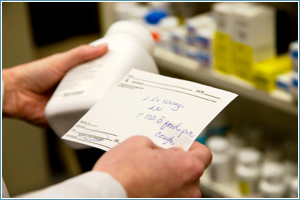Your Health :: Medication that Affects Driving
We all know that drinking and driving is both against the law and an unwise decision. Unfortunately, alcohol is not the only drug that impairs drivers. Senior drivers are the most likely to drive while taking multiple medications, putting them at risk for medication-related crashes.

Both prescription and over-the-counter medications can:
- Slow reaction time
- Blur vision
- Diminish concentration
- Impair mobility
- Cause drowsiness or dizziness
Cough syrups, pain relievers, and even herbal remedies may have unexpected side effects or interact with other drugs or food.
If you are taking medication, ask your doctors and pharmacists about the effects they may have on your driving. Be sure you understand how drug interactions can affect you.
Common drugs that affect driving:
- Benzodiazepines for anxiety or insomnia
- Insulin for diabetes
- Antipasmodics for ulcers
- Analgesics for pain relief
- Diuretics for edema or high blood pressure
- Antihypertensives for high blood pressure
- Antibiotics for infections
- Antihistamines for allergies
- Cardiac glycosides for congestive heart failure
- Antidepressants









